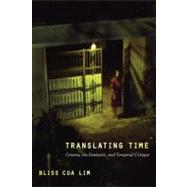Translating Time : Cinema, the Fantastic, and Temporal Critique
, by Lim, Bliss Cua- ISBN: 9780822345107 | 0822345102
- Cover: Paperback
- Copyright: 9/1/2009
Under modernity, time is regarded as linear and measurable by clocks and calendars. Despite the historicity of clock-time itself, the modern concept of time is considered universal and culturally neutral. What Walter Benjamin called "homogeneous, empty time" founds the modern notions of progress and a uniform global present in which the past and other forms of time consciousness are seen as superseded. InTranslating Time, Bliss Cua Lim argues that fantastic cinema depicts the coexistence of other modes of being alongside and within the modern present, disclosing multiple "immiscible" temporalities that strain against homogeneous time. In this wide-ranging study-encompassing Asian American video (On Cannibalism), ghost films from the New Cinema movements of Hong Kong and the Philippines (Rouge, Itim, Haplos), Hollywood remakes of Asian horror films (Ju-on, The Grudge, A Tale of Two Sisters) and a Filipino horror film cycle on monstrous viscera suckers (Aswang)-Lim conceptualizes the fantastic as a form of temporal translation. The fantastic translates supernatural agency in modern secular terms, but also exposes an untranslatable remainder, undermining the fantasy of a singular national time and emphasizing shifting temporalities of transnational reception. Lim interweaves scholarship on visuality with postcolonial historiography. She draws on Henri Bergson's understanding of cinema as both implicated in homogeneous time and central to its critique, as well as on postcolonial thought linking the ideology of progress to imperialist expansion. At stake in this project are more ethical forms of understanding time that refuse to domesticate difference as anachronism. While supernaturalism is often disparaged as a vestige of primitive or superstitious thought, Lim suggests an alternative interpretation of the fantastic as a mode of resistance to the ascendancy of homogeneous time and a starting-point for more ethical temporal imaginings.






